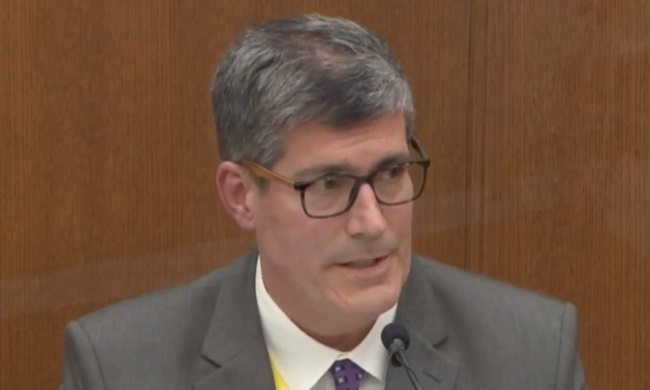After defence attorneys at the trial of three former Minneapolis police officers charged with violating Floyd’s civil rights raised questions about how Floyd died, the chief medical examiner who ruled his death a homicide testified on Tuesday that he felt no pressure to include anything in the autopsy report.
Hennepin County Chief Medical Examiner Dr. Andrew Baker
Officer Derek Chauvin knelt on Floyd’s neck for 9 and a half minutes while he was handcuffed, facedown, and gasping for oxygen on May 25, 2020, and federal prosecutors allege that former Officers J. Alexander Kueng, Thomas Lane, and Tou Thao violated their training by neglecting to intervene to save Floyd’s life. Lane held Floyd’s knees while Kueng knelt on his back, while Thao kept onlookers at bay.

Hennepin County’s chief medical examiner, Dr. Andrew Baker, concluded that “subdual, restraint, and neck compression” on the part of police officers was the direct cause of Floyd’s death.
Both cardiovascular disease and substance abuse, he noted, played a role but were not the “top line” explanations. He said that Floyd’s larger heart and restricted arteries necessitated more oxygen than usual.
On Tuesday, Robert Paule, an attorney for Thao’s estate, asked Baker if he felt compelled to include “neck compression” as a contributing cause in the autopsy report. According to Baker’s testimony, on the day of Floyd’s autopsy he told prosecutors that he saw no physical signs of hypoxia or oxygen deprivation.
As part of their initial charge against Chauvin, prosecutors included a statement detailing Chauvin’s preexisting health issues, police confinement, and possible intoxicants.
Some of the “hundreds” of calls Baker’s office got were threatening or aggressive, he claimed. Dr. Roger Mitchell, a former medical examiner for the District of Columbia and an expert on deaths that occur in prisons, also called Baker to express his displeasure.
Read Also:
- Samsung’s New Little Freestyle Projector
- Tesla Delivers More Than 200,000 Vehicles
- Biden Renominates Jerome Powell as Fed Chair
- Ketanji Brown Jackson Fought Injustices While at Harvard
- Evergrande Dodges Default Again But Sector Debt Concerns Remain
Last Words
According to Baker, Mitchell planned to publish a critical op-ed in The Washington Post and the two discussed neck compression. Baker claimed that he took Mitchell’s thoughts and analysis into account before deciding to include neck compression in his report.
Baker testified under oath that talking to other pathologists is common practise and that neither the harassing phone calls nor the conversations with their colleagues made him change his mind on Floyd’s cause of death.















